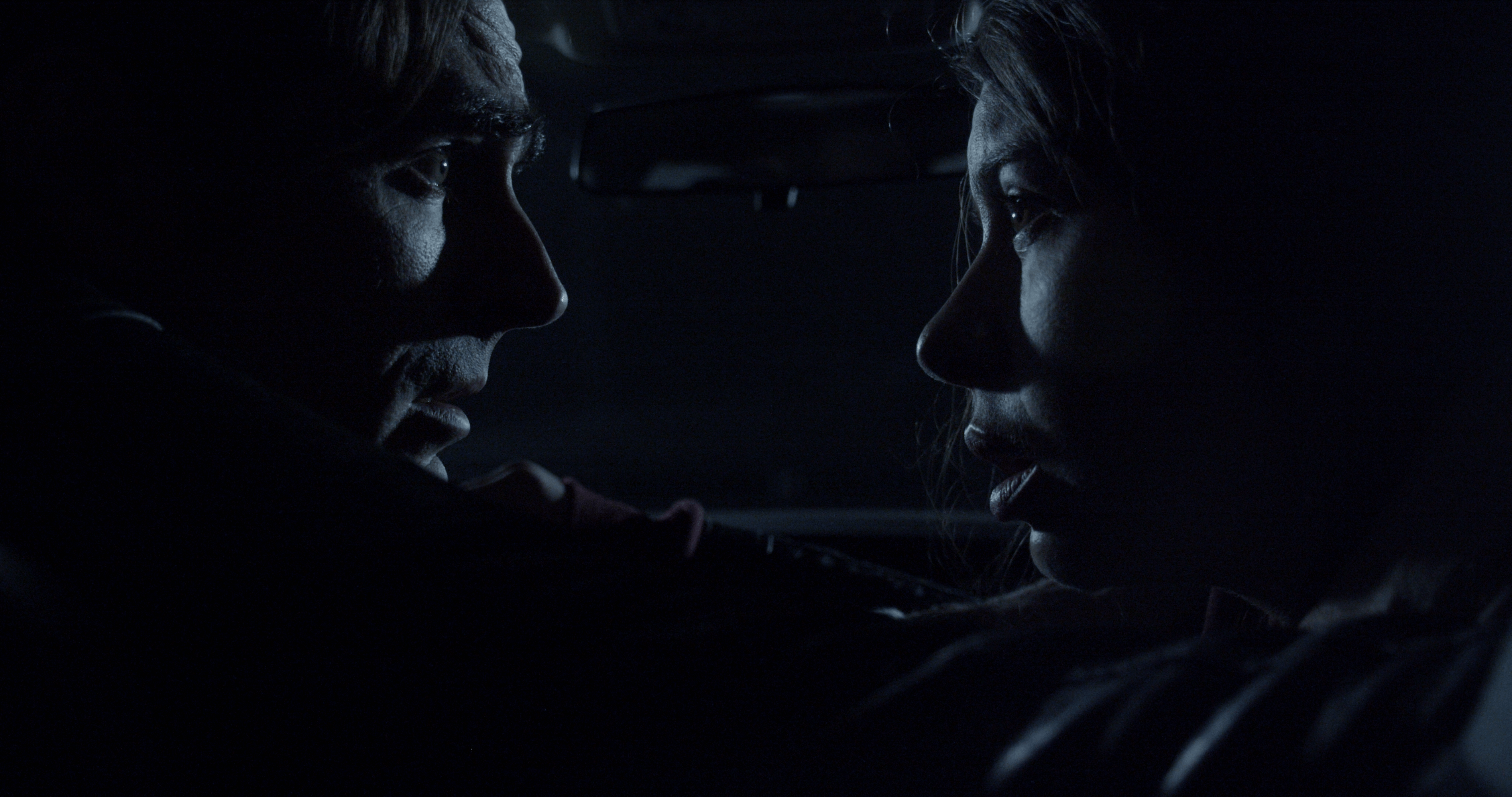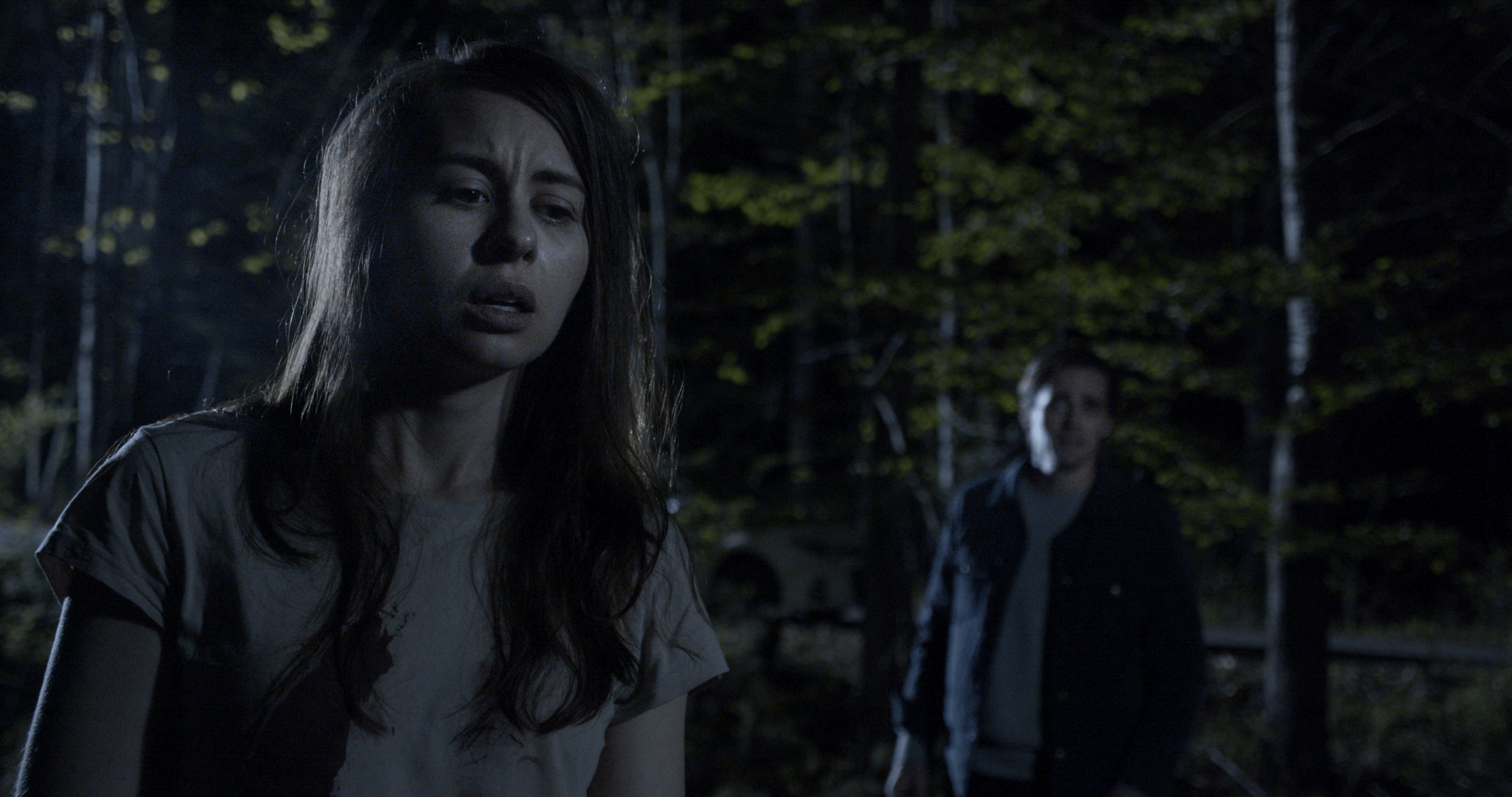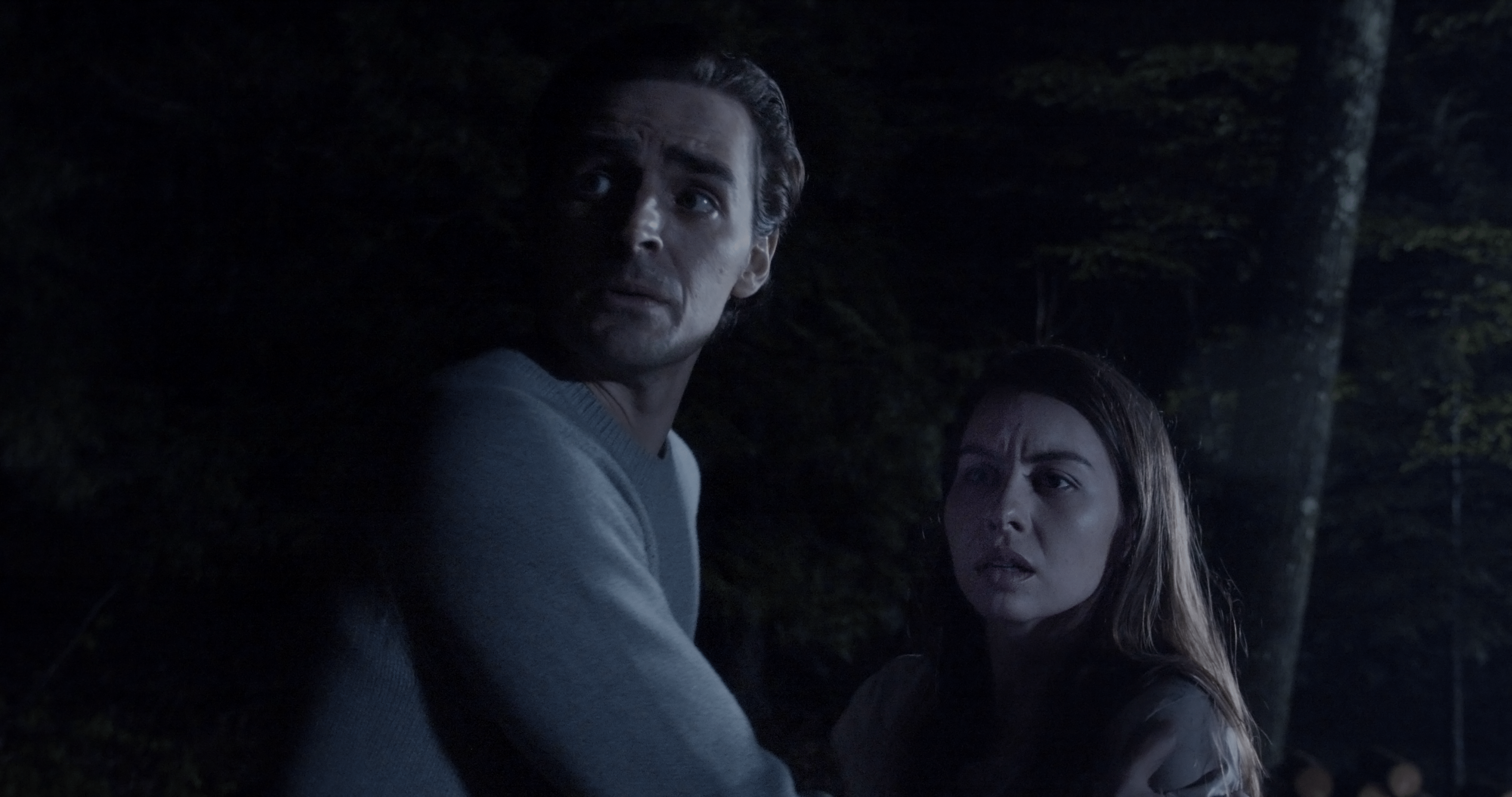The horror genre has always been harnessed to embody the darkest emotions, bringing our greatest fears to life. In new indie horror thriller “An Unquiet Grave,” filmmakers Terence Krey and Christine Nyland portray the many stages of grief onscreen.
The film picks up one year after Jamie (Jacob A. Ware) loses his wife Jules in a car accident. On the anniversary of her death, widower Jamie and his sister-in-law Ava (Christine Nyland) return to the scene of the accident in hopes to become more connected to Jules. Jamie seeks to perform a strange ritual, while Ava quickly learns he has darker intentions. An Unquiet Grave premiered on the closing night of the virtual Nightstream Film Festival.
The Knockturnal: Congratulations on the world premiere of An Unquiet Grave! What was it like partnering with Nightstream to debut the film?
Christine Nyland: First of all, it’s just very cool to have the film finally premiering somewhere. We shot it in the spring of 2019, and then the pandemic happened right around when it was finished and being submitted. We were just like “is anyone ever going to see this movie? When will there be a film festival again?” Things just felt very up in the air for a while, and Nightstream came together very quickly, even for the organizers and especially for us. It’s been a little bit of a whirlwind.
Terence Krey: I think everyone initially felt like when festivals were going online it was going to be a diminished experience, but I think it’s really great because the film is very accessible now, and people can watch it in their own homes. I feel like Nightstream has really gone to bat to do things to get people involved and really talking about the films and meeting up with each other virtually. It’s incredible what they’re doing. I feel so much more like the film is finding an audience that maybe might not have happened in a singular live setting. It’s great.
The Knockturnal: I loved that An Unquiet Grave captures the very universal concept of loss, while still offering a horror twist. How were you inspired to write this exploration of grief?
Terence Krey: Christine and I obviously both love the supernatural as something we can use as a huge metaphor for things that people go through and deal with. I feel like grief and the story were something that we found. It was interesting because it really started from wanting an unconventional relationship. We were going to do a two-hander and we knew that we wanted an unconventional relationship between a man and a woman. We landed on: what if they have a shared loss? Jamie, the widower, and Ava who is the sister of this person who has passed away. That just seemed like a really interesting relationship to jump into, and then from there is where grief came in and the supernatural element of someone coming back that we would both like back very much.
Christine Nyland: I would agree with that, I think that’s definitely accurate. When we were talking about making the film and we knew we wanted to write something for me and Jacob [A. Ware], I remember in particular, I was like, “I don’t want them to be a couple. It’s not like a cabin in the woods with two people. I want to do something that has enough meat to that relationship so it can really support a feature-length film.” That was very much how we came at it.
The Knockturnal: Christine, your character Ava is working through a loss while having this small glimmer of hope but not really knowing what to expect. There are a lot of curveballs thrown her way, some that are scary and others that are emotionally disturbing. What was your journey into Ava?
Christine Nyland: Ava was interesting because I think I was really trying to work with a dichotomy. She’s a very warm person but she’s also very guarded. We often sort of see cold and guarded, and warm and inviting, together. That was really the core duality of her. She’s the lifeblood of the film. Jules is dead, Jamie wishes he could go with his wife, and Ava is the only still trying to live in this world and Jamie is pulling her to do this thing. I wanted to sort of present the liveness and the seduction of that, and the way she is navigating being open to the idea of having her sister back but resistant to the idea of how they are doing it.
The Knockturnal: That comes through really well onscreen and definitely anchors the film. Ava is sort of an audience insert, but the plot really shows both sides of the spectrum: those who want to be reunited with their lost loved one, and those who are working to return to a state of normalcy. Without giving the ending away, what do you hope audiences take away from the film?
Christine Nyland: I think for me it’s always about situations wherein film, especially horror, you often get this big catharsis. What’s interesting to me about the end of this film is it really leaves me with a sense of “well what do you do now? How do you pick up the pieces after everything that’s happened?” That’s the real nightmare of the film.
Terence Krey: I think that it’s not a clean ending in a number of ways, and I feel like as much as the world is heightened and the kind of magic is happening, the reality of what these two characters have gone through and done to each other, we never wanted that but that’s very grounded. Another thing– without being too spoiler-y about the ending itself–Christine and I in writing it together and making it together have talked about how the whole film is like holding in a breath. There’s very little catharsis, it’s constantly feeling it in your chest. That’s very interesting, and I’ve always thought of it in the way of how it relates to the ending.
The Knockturnal: You both have worked on numerous projects together. How did you two meet, and what’s next for this partnership?
Christine Nyland: We met because I saw a casting breakdown that was described as post-modern Buffy the Vampire Slayer and I was like, “well I have to work on that!” I guessed Terence’s email address and was like “well I want to work on this!” We both have a very strong affinity for Buffy the Vampire Slayer which has kind of informed our approach to film in a lot of ways and the stories we want to tell. As Terence was saying earlier, we use supernatural elements to heighten emotional states in a way that actually make them feel more real, because when you experience them in real life, they do feel big, they do feel life or death. When you translate them into a supernatural or horror metaphor, they actually are in the stakes of the film. Even if it is theoretically heightened, it doesn’t feel big or false, or it doesn’t have to, and I think that’s something that grounds a lot of our work.
Terence Krey: Before An Unquiet Grave, we had Graves which is the web series I met Christine on. From there we transitioned more into a duo of writing and producing together. Since then it’s been pretty much a bullet train. We actually just shot a film [Distress Signals] in quarantine in the middle of the words in Massachusetts with two other very good friends this past summer. That’s now in post-production which was a lot of fun and a nice respite from what we’ve all been living through this past year. Other than that, we have a few other scripts, one that’s in development and hopefully going into production next summer.
The Knockturnal: How was filming Distress Signals during the pandemic?
Christine Nyland: It was amazing because it was like not filming during a pandemic. We got the smallest team we could and then everyone got tested, and we all lived together in the woods. There was one time we went to the grocery store and we got out of the car and were like “oh wait do we have masks?” We hadn’t been around people in so long. I’m in Tucson now but both of us have been in New York. Especially earlier on even just going outside was stressful, like in the spring and early summer.
Terence Krey: I live in Astoria and there were times when we were planning where I’d just going to the grocery store and be walking down the street during pre-production, and I was like “can we please just be shooting a movie in the middle of Massachusetts right now? That feels so much safer than everything that we’re going through here!” It was just four people: myself, Christine, our director of photography Dan [Fox], and another hand. I’m in the film, that’s how small this thing was.
Christine Nyland: So is John, the fourth person! Everyone’s in the movie.
Terence Krey: Obviously we have a background in this small filmmaking and what we learned with An Unquiet Grave and other things, and so we were able to really be aware of what a film at this scale needs.
Christine Nyland: It was really sort of a fantastic challenge and provocative because we didn’t really know we were going to film it until right before shooting. The plan was always like if someone’s test comes back positive, we pull the plug on the whole thing. Most of it’s me, most of it’s a one-hander. It was such a fantastic exercise in what do you have to have in order for something to be engaging? How do you have moment-to-moment small conflicts and then bigger conflicts that then get smaller again so you have a nice ebb and flow and rise in action, like how do you do all that? We joked that it very much felt like an assignment that you might be given in a screenwriting class so you can then have everything else feel easier after it.
The Knockturnal: I’m definitely looking forward to seeing Distress Signals. And why not shoot a cabin in the woods horror movie during quarantine?
Christine Nyland: Now is the time!
“An Unquiet Grave” premiered during the Nightstream Film Festival on October 11th




